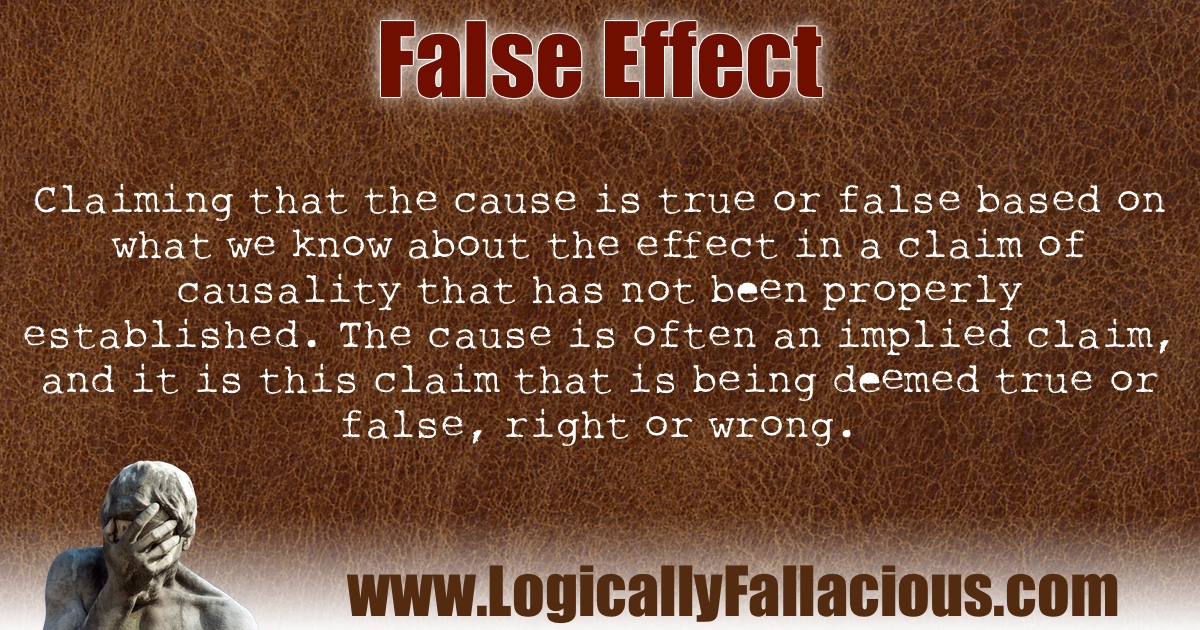Description: Claiming that the cause is true or false based on what we know about the effect in a claim of causality that has not been properly established. The cause is often an implied claim, and it is this claim that is being deemed true or false, right or wrong.
Logical Forms:
X apparently causes Y.
Y is wrong.
Therefore, X is wrong.
X apparently causes Y.
Y is right.
Therefore, X is right.
Example #1:
Mom: Watching TV that close will make you go blind, so move back!
Jonny: That is B.S., Mom. Sorry, I am not moving.
Explanation: The false effect of watching TV too closely is going blind. For the most part, the threat that you will “ruin” your eyesight is an old wives’ tale. Almost certainly, nobody is going blind from sitting too close unless they ram their eyes into the protruding knobs. Regardless of the false effect (i.e., blindness), watching TV too closely (the cause) has been shown to have some adverse effects on vision, so concluding that one shouldn’t “move back” from sitting too close is fallacious.
Example #2:
The Church used to claim that giving 10% of your income to the Church will free a child’s soul from Limbo into Heaven, so clearly giving money to the Church is a scam!
Explanation: Centuries ago, the Church did accept “contributions” to get loved ones out of “Limbo,” and it wasn’t until 2007 when the Church made it clear that Limbo was a theory and not an official doctrine of the Church, separating the Church from that belief. As for the argument, the false effect of “freeing a child’s soul from Limbo” does not warrant the conclusion that giving your money to the Church is a scam.
Example #3:
The presence of police at protests cause an escalation of violence. It was the case that at the protest last night attended by uniformed police, there was an escalation of violence. Therefore, police should not be at protests.
Explanation: We begin with a causal claim: The presence of police at protests cause an escalation of violence (X apparently causes Y). This is just a claim at this point and has not been established, but because there was an escalation of violence (Y is right), it is concluded that the implied claim (police should not be at protests) is true (therefore, X is right). In reality, we don’t know what caused the escalation of violence, so we cannot conclude anything about the claim. In addition, we are assuming we have agreed to the condition:
If the presence of police at protests cause an escalation of violence, then there should be no presence of police at protests.
To which we may not want to agree if we reason that the presence of police at protests results in a greater good.
Exception: It can be difficult to parse the claim that is being said to be wrong or right, in which case the causal link might be what is really being rejected. In our first example, it is fallacious to conclude that there is no reason we shouldn’t watch TV close up. We parsed this from “Watching TV that close will make you go blind.” If one is claiming that the causal claim is what is false after showing the effect to be false, then there is no fallacy.
Mom: Watching TV that close will make you go blind, so move back!
Jonny: That is B.S., Mom. Watching TV too close does NOT make someone go blind.
Fun Fact: This fallacy is different from the false cause fallacy (listed under questionable cause).

This a logical fallacy frequently used on the Internet. No academic sources could be found.